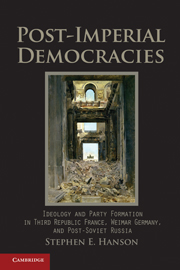 Post-Imperial Democracies
Post-Imperial Democracies Published online by Cambridge University Press: 05 June 2012
The story of how France became a consolidated democracy after its defeat and occupation in the Franco-Prussian War of 1870 has received little attention from students of comparative democratization. It is difficult to understand why. The case is of obvious historical significance: the Third Republic was the first stable electoral democracy with universal male suffrage on the European continent, and its example inspired republicans throughout Europe and beyond. From a theoretical point of view, too, the consolidation of French democracy from 1870 through 1940 poses fascinating puzzles: surely one would not ordinarily have predicted the long-term success of democratic institutions in a country emerging from a century of dictatorship and violence, in a geopolitical neighborhood dominated by well-established monarchies, and with powerful economic and social elites staunchly opposed to democratic ideals. Moreover, this period of French history is intrinsically dramatic and fascinating in its own right, filled with unpredictable twists and turns and animated by intense philosophical debates about the most enduring problems of politics.
That the origins of the Third Republic have nevertheless so rarely been subjected to political science analysis may reflect in part the bad reputation of that regime in the wake of its collapse during World War II. Given the rapidity of France's capitulation to Hitler, the burning issue for comparativists was to explain the fragility of French democratic institutions rather than to account for the success of French democracy in the first place.
To save this book to your Kindle, first ensure no-reply@cambridge.org is added to your Approved Personal Document E-mail List under your Personal Document Settings on the Manage Your Content and Devices page of your Amazon account. Then enter the ‘name’ part of your Kindle email address below. Find out more about saving to your Kindle.
Note you can select to save to either the @free.kindle.com or @kindle.com variations. ‘@free.kindle.com’ emails are free but can only be saved to your device when it is connected to wi-fi. ‘@kindle.com’ emails can be delivered even when you are not connected to wi-fi, but note that service fees apply.
Find out more about the Kindle Personal Document Service.
To save content items to your account, please confirm that you agree to abide by our usage policies. If this is the first time you use this feature, you will be asked to authorise Cambridge Core to connect with your account. Find out more about saving content to Dropbox.
To save content items to your account, please confirm that you agree to abide by our usage policies. If this is the first time you use this feature, you will be asked to authorise Cambridge Core to connect with your account. Find out more about saving content to Google Drive.